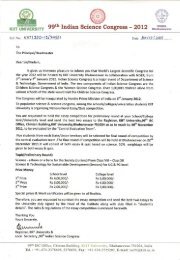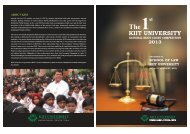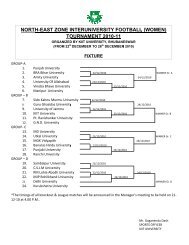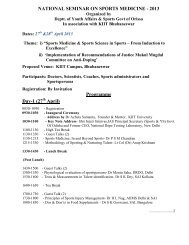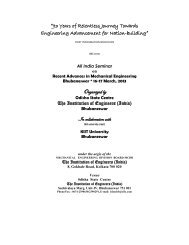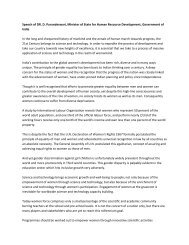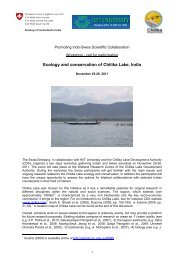PANEL ORGAN - KIIT University
PANEL ORGAN - KIIT University
PANEL ORGAN - KIIT University
Create successful ePaper yourself
Turn your PDF publications into a flip-book with our unique Google optimized e-Paper software.
E-mail: <br />
Gender Bias in Health and Nutrition Care in Patrilineal Societies in India<br />
Inequities, driven by overwhelming poverty, affect both male and female in developing<br />
world. Yet cultural traditions, scant economic resources and limited opportunities often<br />
marginalize females all over the world. Males have better across to health care, nutrition<br />
and education. Gender bias has spread throughout as men retain economic and political<br />
power. Women’s health issues have traditionally been ignored in patriarchal systems.<br />
Many Indian women go through life in a state of nutritional stress, with little control over<br />
their own fertility and reproductive health, and face violence inside and outside the<br />
family. In many households across the country, boys generally enjoy preference over girls<br />
in matter of health care. Mortality and morbidity rates are apparently higher, and severe<br />
clinical forms of protein calorie malnutrition like kwashiorkor more prevalent in girls than<br />
in boys. The prevailing distortion in population sex ratio in all the states of India,<br />
excepting Kerala, is in line with these findings.<br />
DKHAR, Dr. Valerie, Pondicherry <strong>University</strong>, Puducherry, India, E-mail:<br />
<br />
The Effect of Socio-Cultural Factors on Gender Preference in Khasi Society<br />
The relative value of male and female children is the outcome of many economic, social,<br />
cultural and demographic factors as well as the role assigned to sexes by the society. The<br />
preference of a female child in matrilineal societies is indicative of the kind of social<br />
structure that exists in these societies, since descent and inheritance is traced through the<br />
female line. Due to the very nature of matriliny, it becomes imperative to beget a female<br />
child in order to ensure the succession of the clan. This leads to a preference for a female<br />
child. This paper, however, seeks to explore whether families of the Khasi matrilineal<br />
society in Meghalaya are still deeply rooted in this tradition or with time, changing their<br />
perspective due to certain factors like education, modernization and globalization and the<br />
impact thereof on the children.<br />
NONGKYNRIH, Deigracia, North Eastern Hill <strong>University</strong>, Shillong, Meghalay, India, E-mail:<br />
<br />
Girl Child Labour in Patrilineal and Matrilineal Societies: A Case study of Shillong City<br />
Child labour is a phenomenon largely exemplified in under-developed and developing<br />
countries. Literature suggests that the treatment meted out to boys and girls differ<br />
according to the prevalent social and cultural customs and traditions. Under patrilineal<br />
societies it is a well known fact that preference is being given to a boy as opposed to a girl<br />
child; while under the matrilineal societies, equal treatment of both sexes is generally an<br />
observable fact. The only exception under the matrilineal society is the system of<br />
inheritance that is traced through the women. The objective of this paper, therefore, is to<br />
examine the extent of girl child labour in a matrilineal set up and whether there are any<br />
differences in the treatment towards the girl child under the prevailing customary<br />
practices of the society.<br />
<strong>PANEL</strong>-03: GLOBALIZATION AND CHILDHOOD<br />
26 th November, 2012 Time: 14.00-16.30hrs Hall No.:<br />
<strong>PANEL</strong> <strong>ORGAN</strong>IZER





